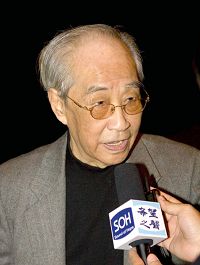(Clearwisdom.net) Mr. Cao Junlin is one of the few special talents in the Peking Opera circle capable of playing both a martial character and a singing role. His performance in the song and dance drama "Girl Mengjiang" took Shanghai by storm in 1945. It was the first song and dance drama in modern Chinese history. In addition to his many performance experiences, since 1980 he has also been invited to teach in Sweden, Germany, and Austria. He was a committee member of a Chinese opera association and the chief executive of the Fu Hsing Dramatic Arts Troupe. In the 1960s, as a famous Peking Opera scholar, he hosted a TV program that introduced Peking Opera to its viewers.
Mr. Cao has researched the Peking Opera and dance since 1949. His students have included people whose talent is Peking Opera or dance, and who are now all faculty members in different schools and educational departments. He designed a complete curriculum in Peking Opera techniques for the National Fu Hsing Dramatic Arts Academy, Lu Guang Dramatic Arts Academy, National Institute of the Arts, Chinese Culture University, and Hai Guang Dramatic Arts Academy. The set of techniques he taught was very strict and serious, and has become a classic for studying Peking Opera.
The Han, Manchu, Mongolian, and Tibetan were all in there, something I've not seen for years
Now approaching 80, Mr. Cao attended the Divine Performing Arts (DPA) Chinese Spectacular performance in Taipei on March 15. He highly praised the traditional classical Chinese dance in the Spectacular. He said, "I have not seen such a good dance performance for so many years."
Peking Opera Master Mr. Cao Junlin hopes the DPA can promote the beauty of traditional Chinese culture and dance on a grand scale
Mr. Cao said, "The DPA's performance was a comprehensive presentation of art, including choreography, music, and acting. The performance was totally about Chinese culture, without any elements from foreign countries. Ethnic groups like the Han, Manchu, Mongolian, and Tibetan were all represented. I've lived in Taiwan for so many years, and I've never seen a dance performance as good as this."
Commenting on the costumes, he said, "The designers must have put a lot of effort into them."
The Spectacular moves people subtly
Mr. Cao noted that pieces like "The Risen Lotus Flower" and "The Power of Awareness" had added dramatic elements, which made it easy for people to understand the presentations. "This was very good. In 'The Power of Awareness,' the audience applauded when three thug-like policemen beat a good person and then were eventually driven out by the joint forces of a just populace. From this example, we can see that it was acceptable to the audience when dance was properly added to a drama."
The dancers were in precise unison
Mr. Cao further praised the unvoiced agreement demonstrated by all the dancers in the group dance, "The Power of Awareness." He said, "It was not just one person, it was instead performed by several dozen dancers. However, their movements were identical. There was no such thing as you made a mistake or I made a mistake. Not at all. Whoever was supposed to move backward moved backward, and whoever was supposed to move forward moved forward. Their movements were completely in unison when the program ended. That was simply beautiful."
Mr. Cao has been very strict and serious about the performing arts all his life. He said that the DPA dancers, whether male or female, were all very beautiful and well trained. About "Water Sleeves" he said, "The dancers manipulated the long sleeves in great unison. In particular, when they threw out their sleeves, they had absolutely unified movements."
Very pleased, very pleased, very pleased
Mr. Cao thought the dancers must have rehearsed for a long time because they could not possibly have been able to dance in such perfect unison after two or three days of practice. He said, "It is not an easy task for several dozen people to dance in such perfect unison."
He said that the show gave the audience an opportunity to appreciate this kind of beauty, and therefore he was "very pleased, very pleased, and very pleased." He hope that the DPA would promote the beauty and goodness of traditional Chinese culture and dance on a grand scale.




